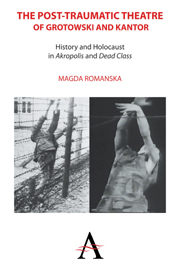 The Post-traumatic Theatre of Grotowski and Kantor
The Post-traumatic Theatre of Grotowski and Kantor from Part II - Our Memory: Kantor's Dead Class
Dead Class is a web of references to Polish culture and literature, as well as to the Bible, the Old Testament and Greek and Roman mythology. These references form the basis of a rich tapestry of wordplay that's lost without an understanding of Polish. As Marek Jodłowski puts it: “Dead Class is a poem, made of predominantly extralingual components, but then again, so is poetry, whether phonic or visual, always extralingual.” Each word evokes a multitude of meanings, symbolic and literal, and layers of historical and literary significations. Nevertheless, while few audience members outside Poland understand the play's language, it is perhaps the lack of understanding that gives Dead Class an aura of enigma, exoticism and international magic. Brian D. Barron describes the process: “When we are all silent, [the actors] slowly animate into Polish words and gestures that are strangely gripping.” If one does not understand the words, they become whatever one wants them to be; the enigma fascinated audiences and fueled their imaginations.
The images Kantor used to create Dead Class reflect the so-called Polish School of Grotesque. Eileen Blumenthal, alone among American critics, rightly noted that “Kantor's vision of the death of culture is very close to themes in Grotowski's work, although his sensibility is linked to a more general tradition of Polish surrealist writing, including the works of Bruno Schulz, Witkiewicz and Gombrowicz.”
To save this book to your Kindle, first ensure no-reply@cambridge.org is added to your Approved Personal Document E-mail List under your Personal Document Settings on the Manage Your Content and Devices page of your Amazon account. Then enter the ‘name’ part of your Kindle email address below. Find out more about saving to your Kindle.
Note you can select to save to either the @free.kindle.com or @kindle.com variations. ‘@free.kindle.com’ emails are free but can only be saved to your device when it is connected to wi-fi. ‘@kindle.com’ emails can be delivered even when you are not connected to wi-fi, but note that service fees apply.
Find out more about the Kindle Personal Document Service.
To save content items to your account, please confirm that you agree to abide by our usage policies. If this is the first time you use this feature, you will be asked to authorise Cambridge Core to connect with your account. Find out more about saving content to Dropbox.
To save content items to your account, please confirm that you agree to abide by our usage policies. If this is the first time you use this feature, you will be asked to authorise Cambridge Core to connect with your account. Find out more about saving content to Google Drive.